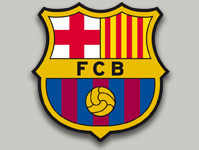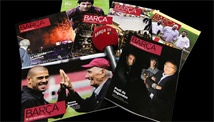FCBARCELONA.CAT
Main menu

Content menu
Club
28.09.2008 13:27
Barça say “no” to violence
www.fcbarcelona.cat
Football in general, and Barça in particular, have reflected upon the incidents in the Olympic Stadium, Montjuïc. When the talk is not of goals, but of flares and panic among many caused by the actions of a few, something is clearly not right.
Violence in football stadiums is nothing new. In the seventies, the Spanish league decided to separate the fans in the terraces from the field of play as a result of a series of incidents. That was when clubs were ordered to set up metal barriers around the pitch (Barça opting for a moat, which was much more comfortable for the fans). And it was not until the eighties that the phenomenon began of groups of young people and supporters travelling together to matches.
From support to violence
The initiative was a good one – these young people added colour to the terraces, but in some cases they started imitating what was happening in other countries. That was when football grounds became a refuge and pretext for violence. They are violent characters, attitudes and behaviours that associate themselves with a club’s colours, crest and flag. It is a widespread phenomenon, with no exceptions.
In the case of FC Barcelona, the most famous example was an initiative started by the fans behind the south goal, who were there to support the team, create an atmosphere and bring colour to match days. But as the years went by, this group starting using violence to express itself, brushing the less radical fans aside and unequivocally ignoring the secular attitude Barça has always shown in the form of public-spiritedness both on and off the pitch.
More than a century of civil behaviour
If this had not always been the case, they would not be calling us today “more than a club in the world.” This public pride forms part of our heritage. It is a much a part of us as our stadium and our colours, and we have no intention of ever losing it. ‘More than a club’ is not a set phrase, and neither is that ‘more’ merely quantitative, but rather, it is also a ‘more’ that speaks of a quality. It is a graphic, direct and effective way of explaining that FC Barcelona is made up of the sum of its people’s attitudes and qualities, from the players through to the supporters and members.
A decisive move
This desire for coexistence and public duty was clearly manifested in the summer of 2003, when the club set up a thorough process by which violent people were expelled from the Camp Nou. It was a success throughout the institution, from the Board and president who set off on a journey with no return to the Barça fans and members who often, as they will well remember, have suffered discomfort as a result of the move when they have come to the ground and taken their seats and found they have not been able to watch the match with the same kind of comforts they have grown used to.
The outbreak of violence in a football stadium, in this case involving fans that use Barça symbols but that in no way represent the supporters of FC Barcelona, is once again of concern to all people in football, and all clubs and all those who form part of them.
In recent years, Barça have shown that they are inflexible, that they have acted with conviction and forcefulness, and have left no room for misunderstood comprehension of uncivil behaviour, in order for stadiums to be cleaned of this violence. Yesterday’s incidents showed that the right thing is being done. It is once again time for zero tolerance, whatever happens, and whatever the cost.


